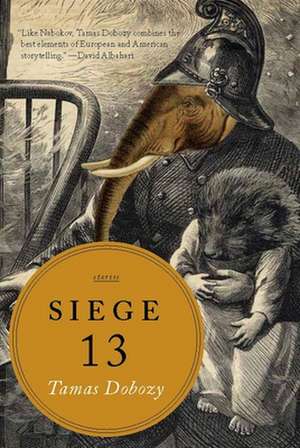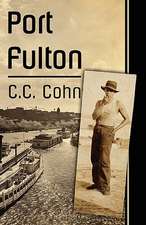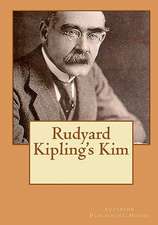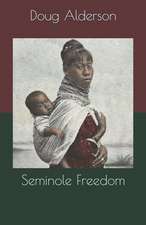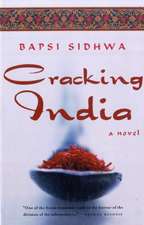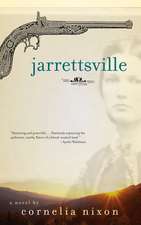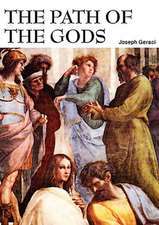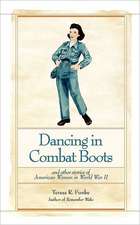Siege 13: Stories
Autor Tamas Dobozyen Limba Engleză Paperback – 18 feb 2013
Vezi toate premiile Carte premiată
These stories follow ordinary people caught between the pincers of aggressors, leading to actions at once deplorable, perplexing, and heroic.
Built around the events of the Soviet Budapest Offensive at the end of World War II and its long shadow, the stories in Siege 13 are full of wit, irony, and dark humor. In a series of linked stories that alternate between the siege itself and a contemporary community of Hungarian émigrés who find refuge in the West, Dobozy utilizes a touch of deadpan humor and a deep sense of humanity to extoll the horrors and absurdity of ordinary people caught in the crosshairs of brutal conflict and its silent aftermath.
Observing the uses and misuses of history, and their effect on individuals and community, Dobozy examines the often blurry line between right and wrong, portraying a world in which one man's betrayal is another man's survival, and in which common citizens are caught between the pincers of aggressors, leading to actions at once deplorable, perplexing, and heroic. Dobozy's stories feature characters, "lost forever in the labyrinth built on the thin border between memories and reality, past and present, words and silence. Like Nabokov, Tamas Dobozy combines the best elements of European and American storytelling, creating a fictional world of his own." (David Albahari, author of Gotz and Meyer).
Illuminating the horror and absurdity of war with wit and subtlety, Tamas Dobozy explores a world in which right and wrong are not easily distinguished, and a gruesome past manifests itself in perplexing, often comical ways.
Winner of the Rogers Writers' Trust Fiction Prize
Praise for Siege 13
"Alice Munro . . . Isaac Babel . . . Those comparisons may sound daunting, but Dobozy has mastered the technical conventions of his craft . . . This vivid rendering of Hungarian history as a nightmare from which no one quite wants to awake is Dobozy's finest achievement." -Garth Risk Hallberg, The New York Times Book Review
"The sheer variety of Dobozy's approaches to telling stories, and his commitment not only to provoke thought but to entertain, constitute a virtuoso performance. Siege 13 is without question one of my favorite story collections ever." -Jeff VanderMeer, The Washington Post"A superb collection of short stories that revisits two of the deadliest months in Hungarian history. The book tells the stories of those who hid, those who fought, those who betrayed, those who escaped and those who died, and how the effects of the siege still linger, three-quarters of a century later. . . . Siege 13 is one of the best books of the year." -Mark Medley, National Post (Canada)
Preț: 90.35 lei
Nou
17.29€ • 17.99$ • 14.27£
Carte disponibilă
Livrare economică 24 martie-07 aprilie
Specificații
ISBN-10: 1571310975
Pagini: 300
Dimensiuni: 132 x 193 x 25 mm
Greutate: 0.32 kg
Ediția:New.
Editura: Milkweed Editions
Locul publicării:Canada
Recenzii
FINALIST FOR THE FRANK O'CONNOR INTERNATIONAL SHORT STORY AWARD
SHORTLISTED FOR THE GOVERNOR GENERAL'S LITERARY AWARD
NAMED A BEST BOOK OF THE YEAR BY QUILL & QUIRE
“Alice Munro...Isaac Babel...Those comparisons may sound daunting, but Dobozy has mastered the technical conventions of his craft... This vivid rendering of Hungarian history as a nightmare from which no one quite wants to awake is Dobozy’s finest achievement.”
—Garth Risk Hallberg, The New York Times Book Review
"The sheer variety of Dobozy’s approaches to telling stories, and his commitment not only to provoke thought but to entertain, constitute a virtuoso performance. Siege 13 is without question one of my favorite story collections ever."
—Jeff VanderMeer, The Washington Post
"The siege of Budapest by the Red Army, which took place near the close of the Second World War and lasted more than a hundred days, informs each of the stories in this collection.... Each story confronts its characters with impossible choices, often forcing them to weigh physical security against moral preservation in a 'desire to find a way out when there is none.'"
—The New Yorker
"From the dark cityscapes of besieged Hungary to the émigré cafés of contemporary North America, Siege 13 spans continents and decades, and in doing so illustrates once again that old maxim: the short story can be both as broad and as deep as a novel. At times gently humorous, at times quietly wise, Dobozy’s thirteen stories dazzle with their psychological nuance and brilliant attention to detail. These stories are never less than breathtaking."
—Jury Citation, Rogers Writers' Trust Fiction Prize
"Thoughtful, haunting and deeply human short stories."
—The Minneapolis Star Tribune
"Gripping, and powerfully written.... these stories come together to create a wonderful book: Bravo, Tamas Dobozy."
—Historical Novels Review (EDITOR'S CHOICE)
"Tomas Dobozy, master architect of this genre and recipient of the O. Henry Prize and Rogers’ Writers Trust Fiction Prize, has crafted thirteen unique, self-sustaining worlds in his new collection, Siege 13.
—Words Without Borders
"PEN/O. Henry Prize winner Dobozy’s energetic stories, a baker’s dozen, are full of Eastern Europeans (Sándor, Tíbor, Lujza, etc.) involved in events unusual to Western readers that are part of the characters’ everyday lives. A natural storyteller, Dobozy typically launches intriguingly titled tales with a declarative sentence that increases the interest: 'The Ghosts of Budapest and Toronto' begins 'Mária didn’t die in the siege of Budapest'; likewise, 'The Miracles of Saint Marx' starts: 'One of the weirder people to surface during the era of Hungarian communism...' When not in Europe, Dobozy’s characters are typically strangers in a strange land. Narrated by a Fulbright Scholar studying at NYU, 'The Atlas of B. Görbe' centers on an elderly and revered yet also overindulgent and corpulent Hungarian-born author (the titular Görbe) who maneuvers in Manhattan like a bull in a china shop. 'The Homemade Doomsday Machin'” charts a little boy’s obsession with the work of émigré nuclear scientist Otto Kovács, who visits him with the machine’s prototype after an exchange of letters. The centerpiece is the novella-length 'The Beautician,' an engrossing tale of love and betrayal among members of the Szécsényi Club, a Hungarian intellectual society in Toronto. Colorful and rich in detail and full of life."
—Publishers Weekly
"Siege 13, Tamas Dobozy's new collection of short stories, shows us once again that he is an excellent storyteller, one of the few who keep the art of writing good short fiction alive. His stories are usually about Hungarians living outside of Hungary, lost forever in the labyrinth built on the thin border between memories and reality, past and present, words and silence. Like Nabokov, Tamas Dobozy combines the best elements of European and American storytelling, creating a fictional world of his own."
—David Albahari, author of Gotz and Meyer
"A superb collection of short stories that revisits two of the deadliest months in Hungarian history. The book tells the stories of those who hid, those who fought, those who betrayed, those who escaped and those who died, and how the effects of the siege still linger, three-quarters of a century later.... Siege 13 is one of the best books of the year."
—Mark Medley, National Post (Canada)
Praise for Last Notes: And Other Stories
"Tamas Dobozy—like David Bezmozgis ("Natasha"), Dave Eggers ("A Heartbreaking Work of Staggering Genius") and even Jeffrey Eugenides (at least in "The Virgin Suicides")—has mastered the art of deadpan, which is hard to pull off in print....We laugh at these wayward, distracted characters, ha-ha-ha! We're laughing at ourselves."
— Susan Salter Reynolds, Los Angeles Times
"These strange and intense stories [are] packed with fast-paced weirdness...treats to be savored. Dobozy, a Canadian of Hungarian descent, likes to upend old saws and twist the routine, and he does this most powerfully in the stories drawn from his European ancestry.”
— Alison McCulloch, New York Times Book Review
“The 10 first-person stories of Dobozy’s debut, remarkable for their psychological and emotional complexity, yearn to make sense of eccentric and opaque behavior, sometimes by engaging in it. The first story, ‘Into the Ring,’ centers on a married couple who box each other to release the mutual frustration of their inability to conceive. In the moving and funny ‘Philip's Killer Hat,’ the narrator tries to dissuade his off-kilter brother from sending letters to the Thelonious Monk estate that explain the musician’s tight-fitting hats ‘contributed to the madness that overtook’ him. Dobozy draws on his Hungarian heritage in several stories. In ‘Four Uncles,’ the narrator recounts his harrowing 1958 escape from Hungary and his later reconnection with his uncles through the Canadian-Hungarian exile community. In ‘The Inert Landscapes of György Ferenc,’ the son of an exiled Hungarian painter recounts his father’s dislike of his adoptive Canada, an ‘art-resistant’ country ‘that would not be reproduced.’ Dobozy's prose is an artistic and intellectual boon.”
—Publishers Weekly
“Quite good, with a sense of humor that Hemon lacks.”
—New York Post
“...Profound. In these pieces, Dobozy doesn’t shy away from engaging The Big Idea in the service of his story. He dares to be intellectual, and even his more traditional stories have an authorial voice that is learned and observing...The stories that comprise Last Notes have a staying power, a bleak charm that remains long after you put down the book.”
—Chris Winters, Bookslut
Praise for When X Equals Marylou
“A brilliant collection. His sentences move like snakes—fluid, jabbing, biting.”
—Michael Turner, author of Hard Core Logo
“Rich and thoughtful without being too sentimental, these stories are sharp and observant.”
—The Portland Mercury
“Dobozy’s stories sparkle like shards of glass.”
—The Globe & Mail
“Gritty, sexy, and all too real.”
—Toronto Star
“The literary equivalent of broken glass in a spoonful of honey. They go down smoothly, with a bit of prickling, then tear the reader apart when they least expect it. Dobozy is an expansive talent.”
—Quill & Quire
“It’s not always a pleasant world that Dobozy creates, but his writing is too powerful (and too real) to stop reading.”
—Nexus
“Reading one of Dobozy’s compellingly odd tales is like floating through a dream world. His characters’ Freudian longings are out in the open, and his logic and language are those of a mildly upsetting nightmare.”
—The Gazette
“Dobozy looks at the ills of modernity with an acute eye. He’s a psychologically-attentive writer...a major literary talent in the making.”
—Westender
“The writing in these stories is often slightly surreal, a quality that comes from Dobozy’s ability to blend beauty with harshness....Sharp and edgy but entrancing.”
—Jay Ruzesky, The Malahat Review
Textul de pe ultima copertă
Praise for Siege 13
“Tamas Dobozy’s stories are usually about Hungarians living outside of Hungary, lost forever in the labyrinth built on the thin border between memories and reality, past and present, words and silence. Like Nabokov, Dobozy combines the best elements of European and American storytelling, creating a fictional world of his own.” —David Albahari
Praise for Last Notes
“Strange and intense.” —The New York Times
“An artistic and intellectual boon.” —Publishers Weekly
“Strikes the right balance between the surreal and the realistic. These stories have a staying power, a bleak charm that remains long after you put down the book.” —Bookslut
Notă biografică
Premii
- Rogers Writers' Trust Fiction Prize Winner, 2012
